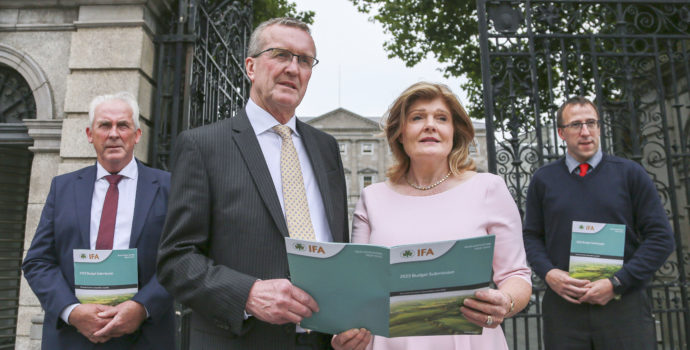Targeted Measures Needed for Farming Sector in Budget ’23

IFA President Tim Cullinan said more Government support will be needed for farm families and Budget ‘23 gives the opportunity to show how truly the Government understands the on-farm challenges and stress experienced by farm families.
Tim Cullinan led a delegation to meet Minister for Agriculture, Food & Marine, Charlie McConalogue and his officials this week.
“There’s huge fear and uncertainty among farmers. We’re hearing it every day of the week as rising input prices erode on-farm margins, and output prices across many sectors are under increased pressure. It’s relentless, with no sign of things improving in the short-term. If anything, the contrary looks more likely,” he said.
Tim Cullinan said the crippling effects of rising input prices cannot be compounded by political decisions.
“The BEEP-S has proven to be positive, with 25,000 farmers participating annually. To date, there’s no commitment of funding for a similar BEEP-S scheme in 2023. The economic sustainability of suckler farms is based on direct income support. The level of support in the CAP Strategic Plan is insufficient and shows a reduction of €28m compared to current levels. It’s vital that a similar nationally-funded scheme is put in place for 2023,” he said
“Agri-environment schemes make up a substantial portion of farm payments each year and are a critical source of income for many family farms. It’s proposed to open ACRES on a tranche basis, which will cause a lag between GLAS and ACRES. Some farmers will be left out of an agri-environment scheme for a year. Not extending participation to all eligible and interested parties into the scheme in 2023 is simply unacceptable. The Minister must ensure that all farmers who wish to participate in ACRES receive a payment next year. The scheme cannot be limited to 50,000 farmers,” he said.
Meeting the 25% sectoral emission ceiling will be extremely challenging for farmers. New measures to reverse the decline in afforestation are also needed and a new ‘Roof-top Solar Scheme’ and ‘Anaerobic Digestion Support Scheme’, financed by the Department of Environment, Climate & Communications, independent of TAMS, would help boost increased investment in renewable energy sources.
“There’s close on €1bn Brexit Adjustment Reserve funding, that needs to be used by end of next year. The vast bulk has yet to be allocated. It’s imperative that farmers, given how exposed the sector is, get the highest allocation of available funding. We’ve submitted a comprehensive submission outlining a series of targeted measures that could build on-farm resilience and support farms through 2023 and beyond, and are available for further engagement. Time is ticking,’ he said.
IFA Rural Development Chair Michael Biggins called on the Government to provide flexibility and increased funding committed to ACRES, ANC and to the beef, sheep and tillage schemes and ensure all farmers willing to participate in ACRES are accommodated.
“Due to high input cost and the scale of the challenge ahead it is vital that the Tillage Incentive Scheme and the Fodder Support Scheme are continued for 2023. Farmers who do not have land suitable to grow and save fodder but carry livestock across the winter should be included in the fodder support,” he said.
In terms of taxation, IFA Farm Business Chair Rose Mary McDonagh called for Budget 2023 to retain all existing agri-taxation measures (including all expiring stock reliefs; young trained farmer reliefs) as well as increasing the Class A threshold for Capital Acquisition Tax to former levels. The need for improved competition within the banking sector and the exclusion of farmland from the Zoned Residential Land Tax were also key priorities.


